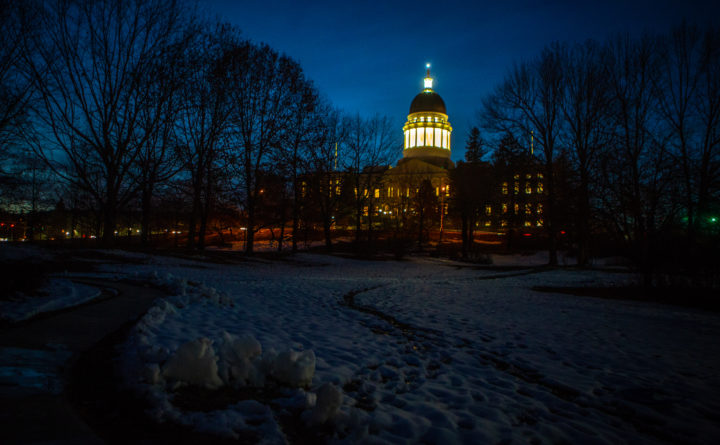Good morning from Augusta, where passage of the 129th Legislature’s first bill into law is imminent.
It’s likely to be LD 477, sponsored by Senate President Troy Jackson, D-Allagash, which would provide financial relief for federal workers furloughed or working without pay should another partial or full government shutdown take place this year. The Senate is expected to approve the bill in a vote later this morning before it heads to the House, and Gov. Janet Mills has already said she will sign it.
Bills to rename bridges also are nearing the end of the legislative process.
A Legislature’s first batch of bills, which typically arrives a month or so after a legislative session has convened, is a definitive marker that state democracy is finally in full tilt, though historically, more often than not, these bills are unceremonious, even rote.
The first act of the previous Legislature was to stall a law passed by voters. At the beginning of the last legislative session, then-Gov. Paul LePage signed the first bill into law, LD 88, which delayed implementation of certain parts of the Marijuana Legalization Act.
In 1999, at the beginning of the 119th Legislature under former Gov. Angus King, it was an emergency bill clarifying the state’s intellectual property laws as they related to the Legislature, after the release of a 1998 documentary, “Person to Person: Legislating Maine,” depicting the ins and outs of the legislative process.
A few years earlier, in 1995, just as King was succeeding John McKernan in the Blaine House, the 117th Legislature’s first bill extended the deadline for the Committee to Study Organizational and Tax Issues in public schools to report its findings to the governor’s office. Days later, a bill setting the parameters of the state’s milk-handling tax, was passed into law.
In the early days of statehood, legislatures and governors set geographic and social boundaries. Throttling back decades to the 8th Legislature in 1828, one of the first bills passed into law by then-Gov. Enoch Lincoln designated the middle channel of the Penobscot River and bay as the dividing line between Hancock and Waldo counties — as it exists today.
In January of 1835, at the start of the 15th Legislature, an act outlining the “safe keeping of persons insane, lunatic or furiously mad” dictated that the town where the “mad person” lives is responsible for his or her well-being until the Supreme Judicial Court had time to intervene and the person can be released. Likewise the town was responsible for damages caused by the person in question, even if that meant injuries to others.
The town of Arrowsic was incorporated at the start the 21st Legislature in 1841. In 1863, at the beginning of the 42nd, the Legislature set jailers’ weekly compensation at no more than $2.
Regulating natural resources and immigration are not new tasks for governors and lawmakers. In 1911, the 75th Legislature established its first-ever scallop season, noting that the “beds are becoming seriously depleted to the point of absolute destruction,” according to the law. Roughly 300 families, dependent on the industry at that time, would’ve suffered if the industry was destroyed, it said. The emergency legislation blocked scallop cultivation or sales, except from April 15 to Nov. 1.
One of the first laws enacted by the 52nd Legislature in 1873 formed Maine’s first Board of Immigration. The board included a commissioner (whose annual salary was $1,000), then-Gov. Sidney Perham, the secretary of state, and a resident of New Sweden — a fledgling colony of Swedish immigrants in Aroostook County.
Under the new law, the commissioner’s duties included “general care and oversight over all immigrants coming to Maine; to give them all needful information, to assist them in settling upon the public lands of the state, or obtaining employment within its borders,” according to the law. The board assigned each adult immigrant “a lot of 100 acres” for five years.
At the end of five years, the state granted a deed to the immigrant or his remaining family for the property if he had built “a comfortable house thereon” the property, and more than 15 acres had been cleared — “ten of which shall be laid down to grass.”
Regardless of which bill lands first on Mills’ desk, what’s likely to be the Legislature’s most significant work this session — an $8 billion budget to fund Maine government for the next two years — is months away, as the Appropriations Committee won’t begin public hearings on it until next week.
Today in A-town
Maine’s top judge will update lawmakers on the state of the judiciary branch. Chief Justice Leigh Saufley of the Maine Supreme Judicial Court will deliver her annual address to the Legislature at 11 a.m. today. The House and Senate are slated to hold short sessions before Saufley’s speech. Here is her soundtrack.
Most legislative committees will meet today with budget work and hearings on energy, tax-break and vehicle inspection bills scheduled. On the busy schedule today is work in the Health and Human Services committee on Mills’ supplemental budget. The bills getting public hearings on Tuesday include proposals to develop a 10-year energy independence plan, exempt feminine hygiene products from the sales tax and roll back vehicle inspection requirements to varying degrees.
Reading list
— With a referendum hanging over their heads, lawmakers spent hours Monday hearing from both sides on a bill to mandate paid sick leave in Maine. The public hearing before the Labor and Housing Committee drew dozens of opponents and proponents, Maine Public reports. The bill, introduced by Sen. Rebecca Millett, D-Cape Elizabeth, would require companies and organizations with more than five employees to provide paid sick leave. The Maine People’s Alliance and its allies have been collecting signatures for a citizen initiative that would trigger a statewide vote on a similar measure. Given strong support among Democrats who control both chambers of the Legislature, even opponents acknowledged that some form of paid sick leave mandate would likely be enacted, but they asked lawmakers to work with them to minimize the added administrative costs and consider the overall financial impact of the host of progressive workplace initiatives being considered during this legislative session.
— The governor pulled Maine out of a group that supports offshore drilling. Surprising no one, Mills — who has made reducing the impact of climate change a priority — announced Monday that Maine would leave the Outer Continental Shelf Governors Association, which supports offshore drilling for oil and natural gas. When LePage joined the group in 2015, Maine became the only New England state in the group. When she was attorney general, Mills joined Maine’s congressional delegation in criticizing President Donald Trump’s suggestion that more coastal waters should be opened to drilling.
— Maine kids won’t be forced to take cursive handwriting lessons in public schools. A bill to mandate cursive handwriting instruction in third through fifth grades earned a unanimous “ought not to pass” recommendationfrom the Legislature’s Education Committee on Monday. Lawmakers will send a note to the Department of Education, asking that educators consider including cursive instruction in their curriculum.
— Bears in Maine can sleep — or wake up — soundly this spring. The Legislature’s Inland Fisheries and Wildlife Committee unanimously shot downa bill that would have allowed a spring hunting season in Maine. Landowners, guides and the Department of Inland Fisheries and Wildlife opposed the proposal. Maine has a 13-week fall bear hunting season.
Getting it write
I must admit that the demise of the cursive handwriting mandate billunleashed another flood of childhood memories. But whenever I mention my 1960s classroom experiences, it traumatizes modern-day teachers. So I will keep this brief and leave out some sordid details.
In first grade, our priority was learning how to read and add. We spent hours with Tip and Mitten, who were the heirs to Dick and Jane in the world of reading primers. We also spent hours doing group work — which in the 1960s was really more like open competition — to solve simple equations.
Among the tools she brought to the classroom were rulers and rubber bands. I will leave it to your imagination as to how she worked them into her lesson plans. But she was not a nun and there was no abuse.
There was no room for individuality or personal style. There was a right way and a wrong way to write. Despite being a generally compliant lad, I never mastered it quite the way she wanted it. Hence, my penmanship grade always sullied what would otherwise be stellar report cards. It was always my worst grade, and I got into even more trouble during one quarter when I asked why she did not write the C on my report card in cursive.
Ironically, I still write cards and letters by hand, all these years later. But I print. Here is your soundtrack. — Robert Long
Today’s Daily Brief was written by Michael Shepherd, Alex Acquisto and Robert Long. If you’re reading this on the BDN’s website or were forwarded it, click here to receive Maine’s leading newsletter on state politics via email on weekday mornings. Click here to subscribe to the BDN.
To reach us, do not reply directly to this newsletter, but email us directly at mshepherd@bangordailynews.com, aacquisto@bangordailynews.com, and rlong@bangordailynews.com.








